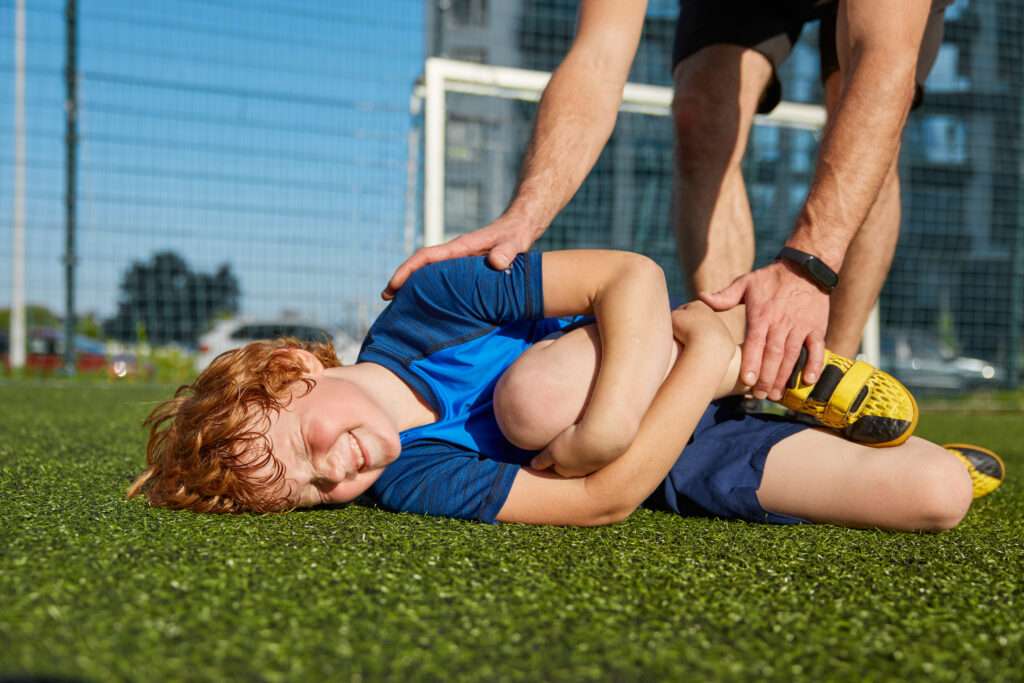
Every parent beams with pride watching their child grow, acing maths tests, making friends, and giving it their all on the sports field. But what happens when that lively physical education lesson ends with a tumble, a tear, and a trip to the accident and emergency department? Sadly, an injury during sports at school in the UK isn’t uncommon, and when it happens, it raises serious questions about responsibility, safety, and what parents can do next.
Your first instinct is to care for your child. Your second, how did this even happen? And your third, could this injury have been prevented, and can we do something about it?
You’re not alone in asking those questions. Whether it’s a sprained ankle from a dodgeball mishap or a more serious injury from poorly supervised rugby practice, we’re here to unpack the facts. When it comes to injury during sports at school in the UK, there are rules, and yes, you may be entitled to compensation if the school did something wrong.
Nearly half of all sport-related A&E visits are children and teens aged 0–19, that’s 47.4% of cases in a UK hospital study from 2012–2014, with peaks at age 14 for boys (68 per 1,000/year) and 12 for girls (34 per 1,000/year).
In one regional fracture clinic, 689 school-age kids (aged 6–18) were treated over a single school year, with 61% of injuries happening during football or rugby
So sit back, take a deep breath, and let us guide you. Because when your child gets hurt, you need more than sympathy. You need solutions, support, and a team of Claim Time Solicitors that know how to make things right.
Are injuries during sports at school in the UK really that common?
You bet they are. According to ROSPA (Royal Society for the Prevention of Accidents), over 40,000 kids in the UK get injured during school sports every year. Yes, every single year.
From harmless sprains to serious knocks, injuries on the pitch or the gym hall are more common than you’d think. Sure, a few bumps and bruises come with the territory, but sometimes, it’s not just “kids being kids”. Sometimes, it’s down to poor supervision, dodgy equipment, or a school skipping safety steps. In short, negligence. And that’s when it’s time to speak up.
What is the obligation of the school in case of injury during sports at school in the UK?
In the UK, schools have a legal duty of care to keep your child safe, not just in the classroom, but anywhere school activities are happening. That includes physical education lessons, after-school clubs, sports fixtures, and even the egg-and-spoon race on sports day.
So, what does that “duty of care” actually mean? Here’s what schools must do:
- Have trained staff supervising all sports activities.
- Carry out proper risk assessments before letting children play on the field.
- Keep all equipment safe and in working order, faulty gym mats or broken goalposts.
- Provide basic first aid when accidents occur.
- Log and report incidents properly, without concealing any details.
If a school lets children play rugby with no adult supervision, ignores broken equipment, that’s not “just bad luck”; it could be a breach of their legal responsibility. And yes, you can hold them accountable.
Does sports injury insurance cover these incidents?
In a word, yes. But it’s not that simple. Most schools are backed by public liability and employers’ liability insurance, which usually includes sports injury cover. So, if your child gets hurt and the school is at fault, the compensation can come from their insurer.
However, insurance companies do not simply hand out cash like confetti. You have to prove that someone was at fault. And that’s where things become complicated.
Don’t worry, you are not in this alone. Claim Time Solicitors knows exactly how to build a solid case, deal with stubborn insurers, and fight for the compensation your child deserves.
Because let’s face it, your child’s recovery matters more than red tape.
What does the law say? The Personal Injuries Proceedings Act and more.
If your child gets injured at school, you’re not just left to figure it out on your own; UK personal injury law has your back.
Claims like these fall under general personal injury rules, with a little help from the Personal Injuries Proceedings Act. And before anything goes near a courtroom, you’ve got to follow something called the Pre-Action Protocol for Personal Injury, which is the official guide for how these claims should proceed.
Here’s how it works:
- Notify the school or local authority that you are considering making a claim.
- Share the important information, such as medical reports, photos, witness details, and so on.
- Try to reach a fair agreement before heading to court.
Most cases don’t even make it to court, especially when you have top-tier legal help from one of the best personal injury firms, Claim Time Solicitors. Because you want results, not legal drama. And we are here to make that happen.
What can you claim compensation for?
If your child has been hurt during school sports because someone dropped the ball (literally or legally), you could be entitled to compensation, and not just for the injury itself.
Here’s what you may be able to claim for:
- Pain and suffering: From sprains to more serious trauma
- Medical costs: Including private treatment, physio, or rehab
- Ongoing care needs: If your child needs extra support to recover
- Emotional distress: Yes, psychological impact counts too
- Your lost earnings: If you had to take time off work to care for them
If you want a quick estimate of what your claim could be worth? If you want a quick estimate of what your claim could be worth, try our Personal Injury Claim Calculator; it’s fast, free, and gives you a ballpark figure in seconds. Because when life throws you the unexpected, it helps to know where you stand.
Let’s bust the “It’s just an accident” myth
We have all heard it: “Kids get hurt, it’s just part of growing up.” Sure, sometimes that’s true. But other times? It’s not just bad luck, it’s bad management.
Here’s when a sports injury isn’t just an accident:
- No proper supervision
- Broken or dodgy equipment
- Unsafe playing areas or gym facilities
- Rules are not being followed or enforced
In these cases, the injury could have been prevented, and that’s exactly what the law looks at. So no, you don’t have to shrug it off. If someone dropped the ball, it’s okay to take a stand, and we at Claim Time Solicitors are here to help you do just that.
How Claim Time Solicitors can help with an injury during sports at school in the UK
We are not your typical stiff-collared law firm; we are real people who genuinely care. When your child gets hurt at school, we don’t just shuffle paperwork; we step in, stand up, and fight for what’s fair.
Here’s what you get when you have Claim Time Solicitors in your corner:
- No-Win, No-Fee, no upfront costs, no stress
- Free case check, no pressure, just honest advice
- Decades of experience with school injury claims across the UK
- Experts in education law and sports injury insurance
- Help with every step of the Pre-Action Protocol for Personal Injury
- Support with evidence, medical reports, and more
You have got enough to worry about, so let us take care of the legal side, while you focus on what matters most: your child’s recovery.
What can you do next after an injury during sports at school in the UK?
If your child has been injured during sports at school, don’t stress, we have got your back. Here’s what to do, one step at a time:
1. Get medical help ASAP: your child’s health always comes first.
2. Ask the school for an incident report: get it in writing.
3. Take some pictures of the injury, the sports area, or anything that looks unsafe.
4. Collect witness details: students, teachers, anyone who saw what happened.
5. Call Claim Time Solicitors – we will walk you through your rights.
6. Try our Personal Injury Claim Calculator: find out what your claim might be worth, in seconds.
No drama, no legal jargon. Just real help when you need it most.
How long do I have to make a claim?
Yes, and it matters. There’s a clock ticking on making a claim. You have 3 years from the date of the incident to start a claim. However, if your child is under 18, the timer doesn’t start until their 18th birthday, so you have time until they turn 21.
Sounds like loads of time, right? But trust us, the sooner you act, the better. Evidence is fresher, memories are clearer, and it gives your legal team more room to work their magic.
Final thoughts: Protecting your child’s future
Let’s be real, this isn’t just about a payout. It’s about standing up, speaking out, and making sure no other child goes through the same thing.
You trusted the school to keep your child safe. If that trust was broken, you deserve answers, accountability, and a bit of justice, too.
At Claim Time Solicitors, we are here to help you turn a painful moment into real change. Whether it’s a twisted knee or something far more serious, we will walk with you every step of the way, with straight answers, expert guidance, and zero fluff.
Because protecting your child’s future starts with taking action today.
Ready to talk? We are ready to help.
Whether you are ready to take action or just want to understand your options, we are just a phone call or click away.
Give us a ring on 0800 970 2727, or request a free call-back. No pressure, no strings, just straight-up support.
When the school drops the ball, we help you score justice.
